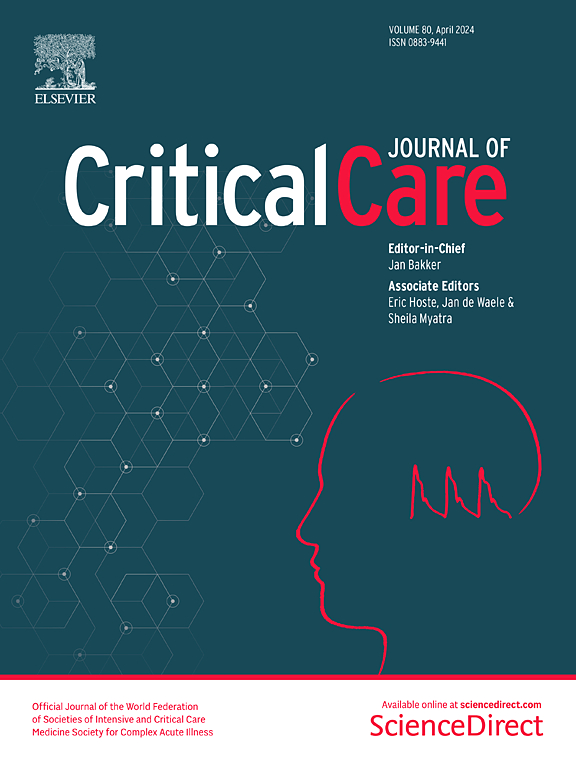Oral care for intubated patients in the intensive care unit: examination of bacterial count and microbiota
IF 9.3
1区 医学
Q1 CRITICAL CARE MEDICINE
引用次数: 0
Abstract
Ventilator-associated pneumonia (VAP) after tracheal intubation is a major infectious complication in patients in the intensive care unit (ICU), with an incidence of 8–28%. Oral care in the ICU is essential; however, the presence of an intubation tube and restricted mouth opening cause complications. A healthy commensal microflora in the oral cavity resists colonization by respiratory pathogens, and poor oral hygiene may increase the risk for VAP. In this study, we examined the effectiveness of oral care on oral bacterial counts and microbial diversity in patients admitted to the ICU. Fifteen ICU patients were included in this study. Oral microbiome samples were collected by swabbing the surface of the tongue. Oral bacterial counts were measured at four time points: before and after oral care, both pre- and post-extubation. Additionally, microbiome analysis was conducted twice: once before oral care pre-extubation, and once before oral care post-extubation. Oral bacterial counts were assessed using a bacterial counter, and microbiome analysis was performed through 16S rRNA gene amplicon sequencing. Oral bacterial counts significantly decreased after oral care at both pre- and post-extubation time points. Microbiome analysis revealed significant differences in alpha diversity pre- and post-extubation samples. Samples post extubation were less diverse. This study demonstrates that oral care effectively reduces bacterial counts in ICU patients, both pre- and post-extubation. Microbiome analysis revealed shifts in microbial diversity, suggesting that the oral microbiota was disrupted during intubation. Given the risk of VAP, oral care may play an important role to prevent VAP in ICU settings.重症监护病房插管患者的口腔护理:细菌计数和微生物群的检查
气管插管后呼吸机相关性肺炎(VAP)是重症监护病房(ICU)患者的主要感染性并发症,发病率为8-28%。ICU的口腔护理至关重要;然而,插管管的存在和限制开口引起并发症。口腔内健康的共生菌群可以抵抗呼吸道病原体的定植,而不良的口腔卫生可能会增加VAP的风险。在本研究中,我们研究了口腔护理对ICU患者口腔细菌计数和微生物多样性的影响。本研究纳入15例ICU患者。口腔微生物组样本通过擦拭舌表面收集。在口腔护理前后、拔管前后四个时间点测量口腔细菌计数。此外,进行两次微生物组分析:拔管前口腔护理前一次,拔管后口腔护理前一次。使用细菌计数器评估口腔细菌计数,并通过16S rRNA基因扩增子测序进行微生物组分析。在拔管前和拔管后的时间点进行口腔护理后,口腔细菌计数明显减少。微生物组分析显示拔管前和拔管后样品的α多样性有显著差异。拔管后的样本多样性较差。本研究表明,口腔护理可有效减少ICU患者拔管前后的细菌计数。微生物组分析揭示了微生物多样性的变化,表明口腔微生物群在插管期间被破坏。考虑到VAP的风险,口腔护理可能在ICU环境中预防VAP发挥重要作用。
本文章由计算机程序翻译,如有差异,请以英文原文为准。
求助全文
约1分钟内获得全文
求助全文
来源期刊

Critical Care
医学-危重病医学
CiteScore
20.60
自引率
3.30%
发文量
348
审稿时长
1.5 months
期刊介绍:
Critical Care is an esteemed international medical journal that undergoes a rigorous peer-review process to maintain its high quality standards. Its primary objective is to enhance the healthcare services offered to critically ill patients. To achieve this, the journal focuses on gathering, exchanging, disseminating, and endorsing evidence-based information that is highly relevant to intensivists. By doing so, Critical Care seeks to provide a thorough and inclusive examination of the intensive care field.
 求助内容:
求助内容: 应助结果提醒方式:
应助结果提醒方式:


